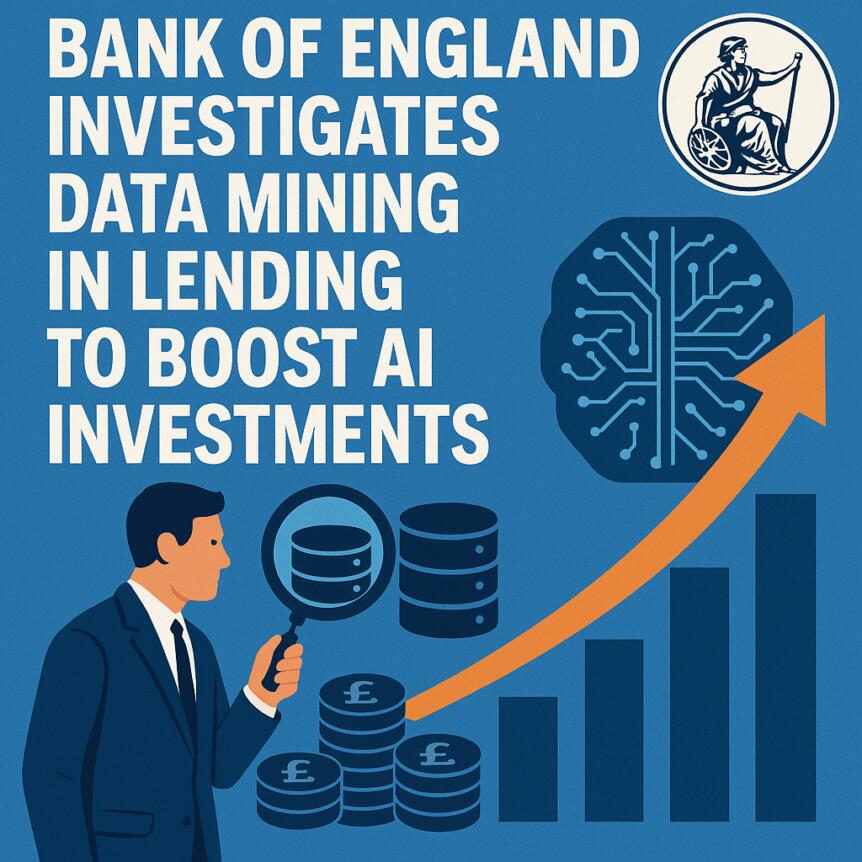Bank of England Investigates Data Mining in Lending to Boost AI Investments

In a move highlighting growing concerns over the speculative nature of AI investments, the Bank of England is scrutinizing the rising trend of financiers funding data centers as a bet on the future of artificial intelligence. This investigation comes amid warnings of potential financial risks associated with high valuations in the AI sector, mirroring the dot-com bubble burst of the early 2000s. As the demand for AI infrastructure accelerates, the central bank is closely monitoring how these off-balance-sheet bets may influence broader financial stability.
- The Bank of England is examining the surge in data center financing linked to AI speculation amid rising market risks.
- By 2030, an estimated $6.7 trillion will be needed to expand AI computing infrastructure, fueling interest in data-center lending.
- The investigation was triggered by rising capital shifts from staffing to massive investments in data center construction.
- Regulators’ cautious approach could impose future limits on this type of AI-related financing, impacting market dynamics.
- Despite strictures on other areas like stablecoins, the UK’s banking sector faces challenges in navigating crypto and AI-related investments.
The Bank of England’s latest inquiry sheds light on a niche but increasingly significant segment of the financial market: funding for data centers that power AI technologies. Although still in its early stages, this niche is poised for exponential growth, with estimates suggesting a need for over $6.7 trillion by 2030 to satisfy surging demand. The funds are being funneled into constructing data centers, considered a key infrastructure component for AI development, as investment in existing AI stocks remains limited, and tokenization of private AI companies is not yet mainstream.
Bloomberg reported that the Bank of England’s probe was prompted by a noticeable shift in capital allocation, with funds increasingly diverted from staffing and operational expenses toward billions of dollars spent on building data centers. This shift indicates a serious commitment from investors seeking to capitalize on the AI boom, though it raises questions about the sustainability and regulation of such large-scale investments.
Hesitant with AI, harsh with crypto
The UK’s financial regulators, including the BOE, have historically been cautious about crypto assets but now show signs of tightening the reins on AI-related financial activities too. The BOE’s probe might lead to future regulatory constraints on data-center lending, potentially impacting returns and slowing innovation within the AI sector.
Meanwhile, UK crypto groups have criticized the Bank of England’s recent proposal to limit individual stablecoin holdings, deeming it overly restrictive and difficult to implement. Despite these protests, UK banks have adopted their own measures, blocking or delaying crypto payments in roughly 40% of cases, highlighting ongoing regulatory ambiguity in the digital asset space.
Potential risks to financial stability
The central bank warns that if the current levels of debt-financed AI infrastructure investment continue to grow, they could pose systemic risks to financial stability. The Bank emphasizes that exposures could be direct—through loans to AI companies—or indirect, via credit facilities extended to financial institutions heavily involved in AI-related assets.
As the AI industry accelerates and data centers become the new backbone of technological growth, regulators’ vigilance is crucial to prevent a bubble similar to past tech sector collapses while supporting innovation responsibly.
This article was originally published as Bank of England Investigates Data Mining in Lending to Boost AI Investments on Crypto Breaking News – your trusted source for crypto news, Bitcoin news, and blockchain updates.
You May Also Like

Hadron Labs Launches Bitcoin Summer on Neutron, Offering 5–10% BTC Yield

The Best Crypto Presale 2025 Set To Surge: Tokens Whales Are Watching And Buying (EcoYield, Snorter, MAXI)
